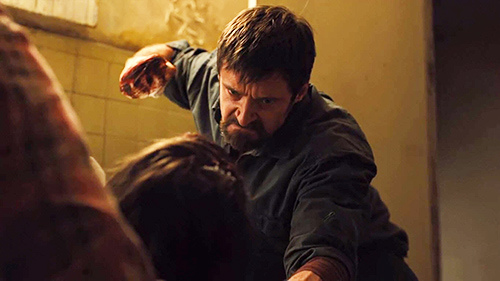In the opening scene of the movie, we hear Keller (Hugh Jackman) recite the Lord’s prayer as a deer walks across the snow-covered woods. As he finishes the prayer, the camera zooms out to show him crouching next to his son Ralph (Dylan Minnette), who has the sights of his hunting rifle on their prey. As Keller says, 'Amen', his son shoots the deer, and the scene closes. His prayer was kind of like saying grace before a meal, and it is appropriate that the deer is destined for the Thanksgiving meal. In the next scene, we see the truck-ride home, during which Keller imparts some wisdom to his son--more or less the Boy Scout motto, “be prepared.” We soon see that Keller practices what he preaches and has a massive stockpile of survival supplies in his basement. He has made sure that he could survive, when disaster strikes. At the Thanksgiving celebration, one other important aspect of his character is shown when his friend Franklin (Terrance Howard) asks Keller what his favorite song is. He replies 'The Star Spangled Banner,' and leaves his wife to clarify that he likes Springsteen, poet-laureate of the blue-collar man.
From these opening sequences, we get the sense that Keller is the last vestige of the pious, hard-working, self-reliant “American” ideal, who does his duty to God and country, cares for his family, and tries to raise his son to be principled like himself. He is convinced that he is prepared for anything that life could throw his way. But then, in the middle of the Thanksgiving festivities, his daughter and his friend’s daughter don’t come back from outside, disappearing entirely. Keller quickly mobilizes the family and his friend’s family to search for them, and after they go to the police, he is determined to do everything he can until his daughter is found. When Alex Jones, an apparently mentally-unstable man, becomes a suspect in their disappearance but is subsequently released, Keller confronts him, and Alex says quietly to him “They didn’t cry until I left them.”
Because of this, Keller is convinced that Alex is the one who kidnapped his daughter, and because he doesn’t think the police are doing a good enough search, he tracks him down at night and kidnaps him. Keller takes Alex to a property that he owns and is renovating, where he ties him up and starts to interrogate and torture him in an effort to get the location of his daughter. His treatment of Alex escalates as the movie progresses, getting more violent and despicable as the search becomes more and more desperate. Still nothing Keller does gets him any closer to finding his daughter. There is a critical scene that illustrates Keller's descent. While sitting next to the torture chamber he constructed for Alex, Keller starts to recite the Lord's Prayer, but when he reaches “forgive us our trespasses,” he breaks down and cannot bring himself to continue, “as we forgive those who trespass against us.”
In the action leading up to the climax of the movie, Keller goes to the house of Alex's aunt, with whom Alex had been living. Once there he finds out that it was actually her that kidnapped his daughter and that she and her now deceased husband have been “making children disappear” for years. She explains that it was how they would “wage war with God. [Making children disappear] Makes people lose their faith. Breeds demons like you.” She goes on to say that Alex had meant no harm to the girls and that he was actually one of their first kidnapping victims. After she injures him, promises to kill his daughter, and shuts him in a deep hole in the ground, Keller becomes aware of his great sin. His hatred and inability to forgive had led him to become the “demon” that Alex’s aunt had designed him to be—committing atrocious acts of violence and cruelty against an innocent man, who was himself a victim. Trapped in the hole, bleeding and despairing of all else, Keller can breathe out no vengeance, no violence, just a desperate plea to God for the life of his daughter.
The story of Keller Dover in Prisoners is an extreme one, but it forces us to face the radical difficulty of our faith and ask ourselves what it means to follow the one who told us to love our enemies--who begged God to forgive the people who were putting him to death. Like Keller, we can be the most righteous, patriotic and prepared people we know, but by refusing to forgive those who do us wrong, we become prisoners to hatred and go down a path that ends in our destruction.


 RSS Feed
RSS Feed
